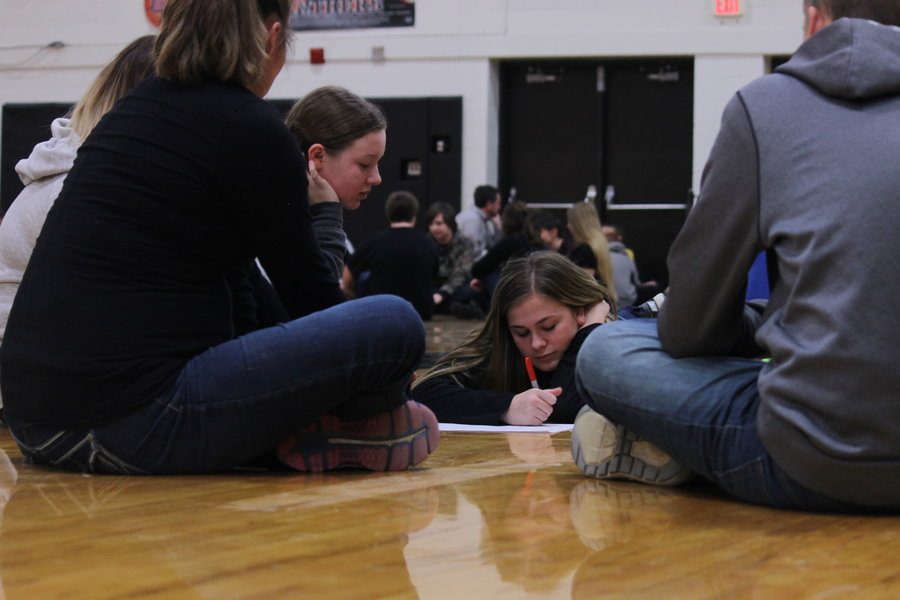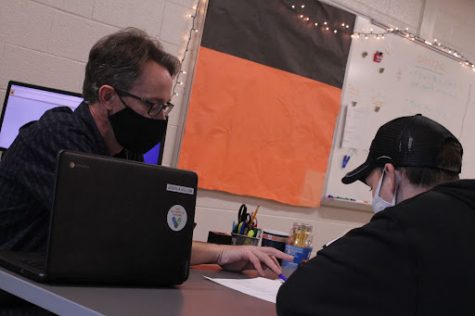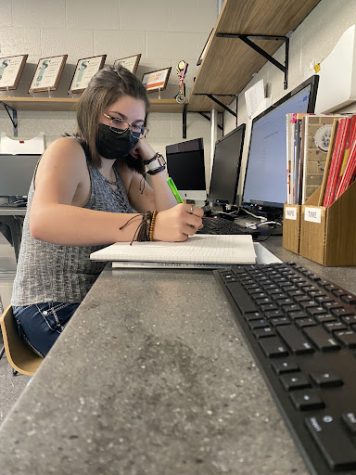Respect, responsibility and relationships
The “three R’s” are covered in anti-bullying assembly
Along with the rest of her group, freshman Kelsey Andrews shares her ideas as to what she thinks helps strengthen high school students’ abilities to treat people with respect as freshman Alexis Killinger writes down a list in the gym on Friday, February 10.
Over one hundred pairs of eyes follow the speaker as the same number of ears intently listened to the directions. Sitting on the floor of the gymnasium on February 10 in two separate seminars, both eighth graders and freshmen participated in an anti-bullying assembly put on and paid for by the Michigan Masonic Charitable Foundation, The Masonic National Foundation for Children and the Free & Accepted Masons of the State of Michigan, along with the Local Stockbridge Masonic Lodge number 130.
Following an optional meeting for parents the evening before, two anti-bullying seminars were held for eighth graders and freshmen to attend. Each seminar covered important topics such as respect, responsibility and relationships.
During the seminars, students formed groups of eight with both boys and girls to discuss and write down what tools they thought help strengthen high school students’ abilities to treat others with respect. After a short amount of time, students shared their thoughts with the rest of the assembly.
Reflecting on what she learned, freshman Sylvia Whitt realized that technology is a large contributing factor as to how teens communicate.
“I learned that little things do, like not making eye contact and stuff like that, actually do affect people and hurt some people,” Whitt said. “I’m gonna’ be more conscious of what I say now and how I act around people. With technology today, it makes it easy to hide behind something so you don’t have to actually connect with someone when you’re talking to them.”
English teacher Pam Gower, along with a few other teachers, was invited to the seminars to listen to what students had to say. According to Gower, the presentations were some of the best she has ever seen done for students.
“I was extremely impressed about the participation that everybody participated and I felt like people were well-behaved and did what was asked and gave really good answers,” Gower said. “I thought I was going to have to go down there and just police, but I didn’t. I got to be a part of it, and it really touched my heart and opened my mind.”
According to a study in 2013 by Social Policy specialist Gail McCallion and Legislative Attorney Jody Feder, school-based bullying prevention programs decrease bullying by up to 25 percent.
“I think in the past we’ve just had students all into a room and somebody talks at them, but because this invited them to interact with each other and ask for feedback about what was happening, I felt like it was actually really useful,” Gower said.









